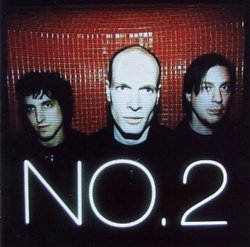| All Artists: No.2 Title: What Does Good Luck Bring Members Wishing: 1 Total Copies: 0 Label: In Music We Trust Release Date: 9/17/2002 Genres: Alternative Rock, Pop, Rock Styles: Indie & Lo-Fi, Singer-Songwriters, Adult Alternative Number of Discs: 1 SwapaCD Credits: 1 UPC: 678277037724 |
Search - No.2 :: What Does Good Luck Bring
 | No.2 What Does Good Luck Bring Genres: Alternative Rock, Pop, Rock
|
Larger Image |
CD Details |
CD ReviewsFor fans of thoughtful Portland pop-punk-pop John L Murphy | Los Angeles | 08/17/2005 (4 out of 5 stars) "This appeals to me as a long-time Heatmiser fan. Neil Gust was of course overshadowed by his band-mate and fellow singer-songwriter Elliot Smith, who was simultaneously pursuing already a solo career on Cavity Search and Kill Rock Stars labels. But Gust, taking often gay themes and working them into Heatmiser's power-pop-punk structures, continues to evolve leading this Portland trio, which keeps tracing the templates Gust (and Smith, even if the latter resisted them) established together as co-frontmen of Heatmiser. This album sounded only so-so when I first played it. It will not exactly leap out at you. You should get used to it slowly, coming back to it in a variety of moods. I returned to it after a long lapse and found that I was ready to appreciate its understated tones and offhand pace better.
This 2002 album follows "No Memory," but progresses smoother. It seems to have been more carefully prepared for than the restless debut which followed Heatmiser's demise more rapidly. The effort in this album, as its plaintive title suggests, may be not as widely heard as Smith's recordings, but admirers of their city's other 90's bands such as Quasi--whose Sam Coombes (ex-Heatmiser) appears on one track, Pond, & Heatmiser should find much to like--as should fans of Smith's more aggressive (if far less Beatlesque and baroque in No. 2) styles. Joanna Bolme, later of (S. Malkmus &) the Jicks and co-compiler of Smith's posthumous album, appears as co-"recorder"; the fourth Heatmiser member, Tony Lash, mixed the sharp & clear pressing. It reminds me at times of Bob Mould vs. Husker Du, as in Sugar he attempted to marry the rawer pop-punk edge with more traditional song stylings and lyrics about relationships and yearning into a catchy delivery that neither insults the listener's intelligence nor strains to be overly sophisticated "college/alternative" self-referential ghettoized rock as a category too insular to be lastingly appealing as song craftsmanship rather than the exorcising of one's inner demons. Mould and Gust contend with issues smartly, packaging them into three-minute messages that convey themselves smartly, yet, at their best, in a humbler persona than a strutting rock poseur. While Mould's critical acclaim, like Smith's, has dominated post-Husker and post-Heatmiser efforts by Gust (contrast those of Grant Hart), I trust that Gust and his band-mates will keep remembering that there's a loyal following for their brand of solid punk-pop as we mature alongside them, and that the demand for their thoughful blend of energy and introspection keeps up as we await a third album from No. 2..." |

 Track Listings (9) - Disc #1
Track Listings (9) - Disc #1